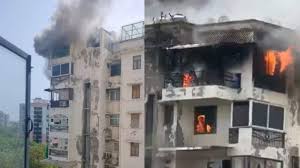What Would You Do If Fire Trapped You 30 Floors Above Ground?
It starts like any ordinary day. Then—smoke creeps down the hallway. Alarms wail. You’re dozens of floors up, with fire spreading fast. There’s no easy way down, and no time to waste. High-rise fires may be rare, but when they happen, the consequences are often devastating.
Limited exits, fast-moving smoke, and dense populations make these emergencies uniquely perilous. Are most people truly prepared?
Why High-Rise Fires Are So Dangerous
1. Complicated Evacuations
Stairwells can become congested, and elevators are deadly during fires.
2. Rapid Smoke Spread
Smoke can flood floors through vents, elevator shafts, and stairwells—often faster than flames.
3. High Occupancy
Hundreds or thousands of people may be trying to escape at once.
4. Firefighting Challenges
Reaching upper floors is difficult, delaying suppression efforts and rescue operations.
What To Do If You’re Caught in a High-Rise Fire

🚪 Stay Calm and Assess Quickly
Panic wastes time. Find the nearest marked exit and leave immediately if safe to do so.
🚷 Never Use Elevators
They can malfunction or open directly into the fire.
✋ Check Doors First
Touch the door with the back of your hand. If it’s hot, don’t open it.
🚪 Close Doors Behind You
This slows the spread of fire and smoke.
↘️ Stay Low
Smoke rises—crawl to stay beneath toxic fumes.
🧣 Cover Your Nose and Mouth
Use a damp cloth to help filter out smoke and irritants.
🟢 Follow Exit Signs
Leave belongings behind. Your life is the priority.
If You’re Trapped
Seal gaps with wet towels or clothing to block smoke entry.
Signal for help from a window using a flashlight or visible cloth.
Call emergency services, and clearly give your location.
Stay low and wait for help.
Preparation Saves Lives
Know your building’s escape plan.
Keep smoke alarms functional and tested.
Have a compact fire extinguisher and know how to use it.
Practice evacuation drills with your family or coworkers.
Lessons from Real Fires
Major high-rise fires in cities like Dubai, London, and New York show a clear pattern: people who stayed calm, avoided elevators, and followed emergency protocols had the highest survival rates.
🔹 Conclusion
High-rise fires are terrifying—but survivable. Awareness, preparation, and fast, clear-headed action can mean the difference between life and death. Don’t wait until the alarm sounds to figure out what you’d do. The time to plan is now.
